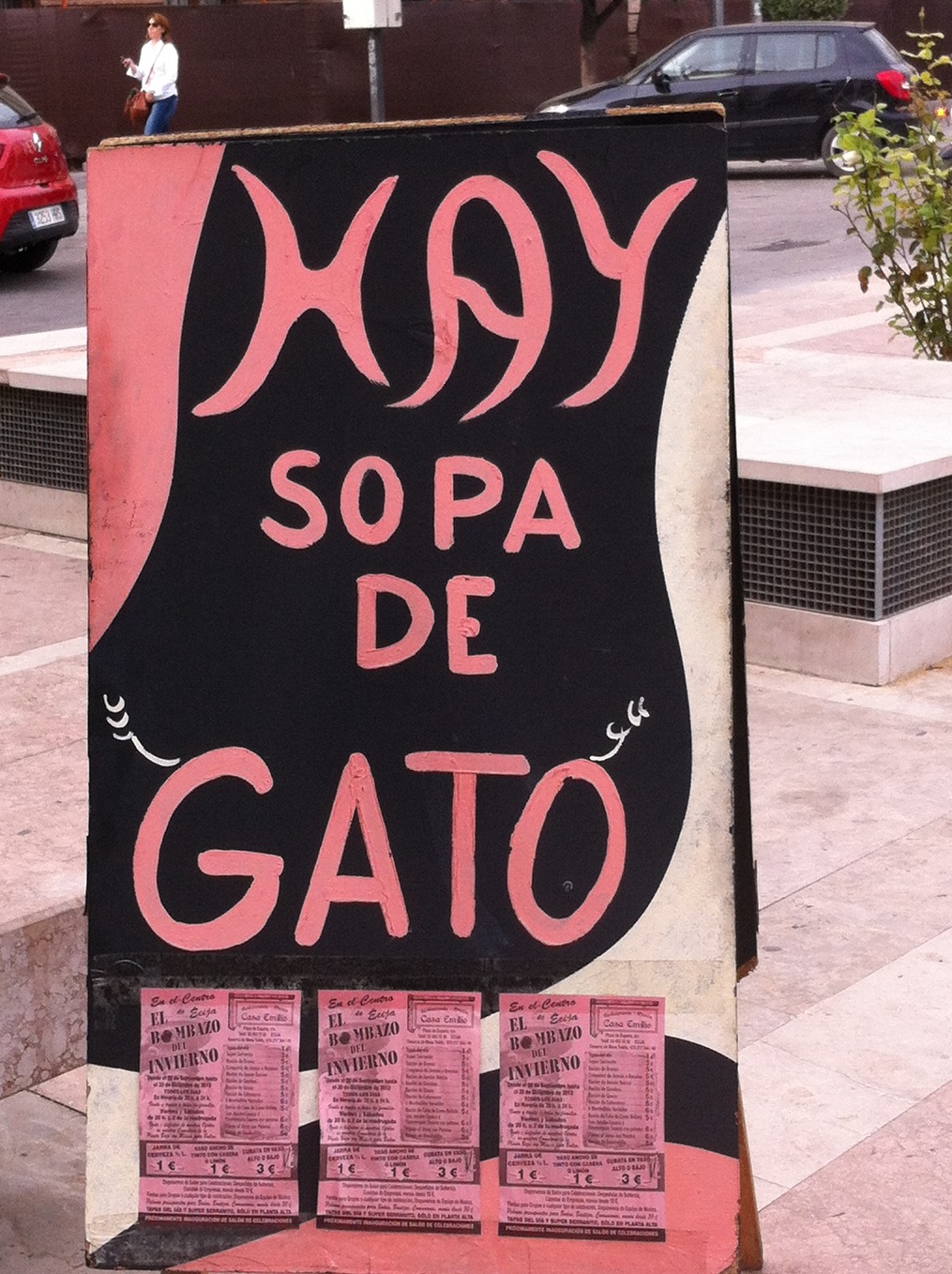Sigh. I do love learning Spanish. And it has taught me so much about English too - it has made me think about the words we use, and just what we mean by them. Translating a thought or a sentence into Spanish challenges the English words we take for granted. I love that Geoffrey Willans quote "You can never understand one language until you understand at least two." Which seems to say what I'm trying to say.
I'm slowly improving. I can frequently go 3 or 4 days without speaking a word of English aloud - top was five days. But at times I hit a complete wall of incomprehension (on my part) and misunderstanding (on their part). And usually it's the stuff you don't learn in lessons.
I go to several intercambio groups. They're really good, though in truth to get the best value from them it is more useful to identify someone with a similar level of the other language, and meet outside the big group for one-to-one intercambio meetings which tend to be more productive for getting the corrections we both need. There are usually quite a few Spaniards preparing for their B1 or B2 exams who appreciate a couple of intensive intercambio sessions to get them more relaxed about English pronunciation.
 So one nice young chap at the Casa Invisible intercambio complimented me on my Spanish (always a good start!) and then added that he read my blog every week as well (oh well, I'm now putty in his hands!). So we swapped email addresses and agreed to meet up the next week for coffee at el Centro de Arte Contemporaneo. Then he emailed: "No me importaría quedarte la semana que viene." Humph. That's a bit rude. "Me importa ..." - it's important to me. "Me importaría ...." - well that's the conditional, so that must mean "It would be important to me ..." So, erm, "No me importaría ...." must mean it would NOT be important to me to meet you for a coffee. Well fine. It doesn't bother me. It was you that had an exam in two weeks’ time, sunshine! So I skipped on to the next email not bothering to finish that one.
So one nice young chap at the Casa Invisible intercambio complimented me on my Spanish (always a good start!) and then added that he read my blog every week as well (oh well, I'm now putty in his hands!). So we swapped email addresses and agreed to meet up the next week for coffee at el Centro de Arte Contemporaneo. Then he emailed: "No me importaría quedarte la semana que viene." Humph. That's a bit rude. "Me importa ..." - it's important to me. "Me importaría ...." - well that's the conditional, so that must mean "It would be important to me ..." So, erm, "No me importaría ...." must mean it would NOT be important to me to meet you for a coffee. Well fine. It doesn't bother me. It was you that had an exam in two weeks’ time, sunshine! So I skipped on to the next email not bothering to finish that one.
The next day at my regular meeting with Number One Intercambio Friend , Jose, something prompted me to check out this phrase "No me importaría ...." and he explained that it meant the chap DID want to have coffee and intercambio! Well how do you work that out? Turns out it's along the lines of "I don't mind having a coffee with you ...." and is used as an affirmative, not a negative. When I went back to the rest of the email it confirmed what Jose had said, and had suggested Tuesday morning (but I'd done a flounce and not read that far!).
“Language is the road map of a culture. It tells you where its people come from and where they are going.” ‒ Rita Mae
Slightly worse was another chap who messaged me after one of my blog posts had said how good my intercambio sessions were. He asked me (in Spanish) what type of intercambio I enjoyed. "Intercambio de las lenguas" I replied, thinking well isn't it obvious that it's language interchange? He messaged back very quickly offering to spend a couple of hours doing "interchange of languages" - or so I thought. Fortunately he explained in the same message that "intercambio de las lenguas" ALSO means exchanging tongues - as in the physical sense! Bleargh - I politely declined. Well, moderately politely.
And finally I cannot finish this post without an honourable mention for Jose. We've been intercambio partners for almost a year now and he remains my best resource and a good friend. But we almost never got started. He found me via my blog on the Expat Blogs site and left a private message for me there. I won't embarrass him too much, and he really does speak excellent English, but suffice it to say that the two phrases "I have seen you on the internet" and "I know where you live" don't immediately create a massive amount of confidence!!! Poor man kept re- sending this message, which I kept ignoring (well you would, wouldn't you?) until finally he sent one which began "I may not have made myself clear ...." and which politely went on to explain that as he is not too far from Colmenar, he thought perhaps we could practice languages together. I am relieved he was persistent! It just shows that a direct translation, without an understanding of the subtle ways each other’s languages are used, can lead to some lovely misunderstandings!
sending this message, which I kept ignoring (well you would, wouldn't you?) until finally he sent one which began "I may not have made myself clear ...." and which politely went on to explain that as he is not too far from Colmenar, he thought perhaps we could practice languages together. I am relieved he was persistent! It just shows that a direct translation, without an understanding of the subtle ways each other’s languages are used, can lead to some lovely misunderstandings!
“If you talk to a man in a language he understands, that goes to his head. If you talk to him in his own language, that goes to his heart”. ‒ Nelson Mandela
© Tamara Essex 2013